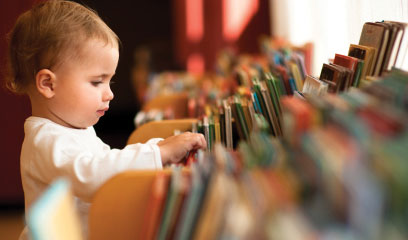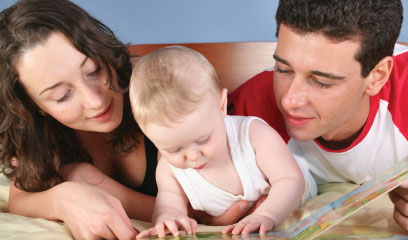 Molly Phariss is building her daughter’s brain without lifting a finger. Well, except to turn the pages of The Going-to-Bed Book by Sandra Boynton.
Molly Phariss is building her daughter’s brain without lifting a finger. Well, except to turn the pages of The Going-to-Bed Book by Sandra Boynton.
Parent-child reading helps prepare infants for future learning, says Dr. Danielle Z. Kassow of the Seattle-based Talaris Research Institute. Not necessarily because of the words on the page, but because of the closeness fostered during story time.
“Experiences with parents help the brain get organized,” Dr. Kassow says. “Any experiences that are loving, warm, nurturing — such as singing, playing or reading together — affect the wiring of the brain.”
“I have a lot of strong memories of my parents reading to me every night before bed,” Phariss says. Phariss, 25, a University of Washington doctoral candidate, always makes time to read to her 6-month-old daughter, Ingrid. Phariss and her husband enjoy rediscovering classic tales with Ingrid, such as Goodnight Moon by Margaret Wise Brown.
Reading together boosts long-term success, Dr. Kassow points out, because it increases attachment. “Research has found that when children have a secure attachment to a parent in infancy, they have better responsiveness to reading when in the toddler and preschool years,” Dr. Kassow says.
Eight tips for reading with your infant:
Captivate your baby’s senses. Research shows that brain areas controlling vision and sensory integration are the first to develop. So it’s no surprise that babies love titles with touchable fur, bright colors, scratch-and-sniff strawberries or books that squeak, rattle and crinkle.
Accept the nutritional benefits of Jamberry. Infants explore with their mouths — in fact, all that tasty cardboard is good for your curious child. They see books as an everyday object they feel comfortable playing with, rather than an off-limits treat. “It’s great for a young child to hold the book and put it in their mouth,” Dr. Kassow says. Phariss keeps her daughter’s books easily accessible, so Ingrid can crawl over and pick one up whenever she’s curious.
Sing a story. Babies love poems, songs and nursery rhymes, particularly when they’re sung by a parent or other trusted caregiver. Once you’ve got a book memorized (it won’t take long) try singing the text while in the car, or waiting at a doctor’s office as a distraction. You may be building long-lasting verbal skills, too; a recent study from Georgetown University suggests that music and language share the same brain real estate.
Select baby-friendly topics. Choose books about animals, routines (bedtime, getting dressed), food or books with many simple, bright illustrations and few words. Talk about what you see on each page and don’t worry about following a narrative. Dr. Kassow points to studies showing that children exposed to a wide variety of words have a better vocabulary by the time they enter school.
See reading as a form of play, says Dr. Kassow. Don’t feel silly putting on a show while reading — make funny noises, speak dramatically or in “parentese,” the sing-song voice that parents worldwide use to converse with babies. Your enthusiasm demonstrates that books can be exciting and entertaining, Dr. Kassow says. Plus, many researchers believe parentese helps prep baby brains for the natural patterns of everyday language.
Bilingualism and books. According to research from the University of Washington, baby brains learn language from human interaction, not expensive foreign-language videos. If you’re bilingual, you can help baby’s future fluency by reading books in your native (or second) language.
Too busy for books? Don’t despair. Once babies start crawling, they may not want to stop for stories. A couple of strategies: Read during mealtime, playtime, or bath time. Phariss reads as her daughter motors around the room. Dr. Kassow suggests keeping reading sessions short: “It’s fine to stop halfway through, and come back to the book later on.”
 Snuggle on the couch or before bed — with a book in one hand and a babe in the other. They’ll enjoy the sound of your voice. “[Ingrid’s] dad reads her the bedtime stories,” Phariss says about their current nighttime routine. “Half the time she’s watching him instead of the books.”
Snuggle on the couch or before bed — with a book in one hand and a babe in the other. They’ll enjoy the sound of your voice. “[Ingrid’s] dad reads her the bedtime stories,” Phariss says about their current nighttime routine. “Half the time she’s watching him instead of the books.”
Dr. Kassow acknowledges that some parents don’t feel comfortable reading aloud to an infant, but even so, you shouldn’t wait until your child is a toddler to bestow the benefits of a good book. “It starts right from birth,” Dr. Kassow says.
Lora Shinn is a freelance writer and children’s librarian. She lives in Seattle with her husband and two children.
What’s on baby’s bookshelf?
12 great books to read with your infant:
Animal Crackers: A Delectable Collection of Pictures, Poems, and Lullabies for the Very Young by Jane Dyer
Black on White by Tana Hoban
Brown Bear, Brown Bear, What Do You See? by Bill Martin Jr.
Dinosaur’s Binkit by Sandra Boynton
First 100 Words by Roger Priddy
The Going-to-Bed Book by Sandra Boynton
Goodnight Moon by Margaret Wise Brown
Jamberry by Bruce Degen
Mr. Brown Can Moo! Can You? by Dr. Seuss
Ten, Nine, Eight by Molly Bang
The Very Hungry Caterpillar by Eric Carle
Where Is Baby’s Belly Button? by Karen Katz









